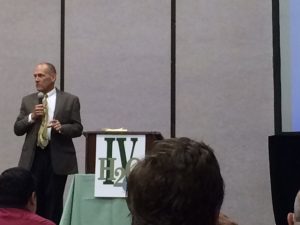
Terry Fulp, deputy regional director for the U.S. Bureau of Reclamation Lower Colorado Region, gives a presention during a forum April 6 organized by Imperial Valley Water (IVH20) at Imperial Palms Resort in Holtville
For those of you who missed the water forum last week, April 6, sponsored by Imperial Valley Water (IVH2O) held at the Imperial Palms Resort in Holtville, this post is meant to share with you the sobering but hopeful message delivered by Terry Fulp, deputy regional director for the U.S. Bureau of Reclamation Lower Colorado Region. Fulp served as the speaker during the forum, and his message was an important one. He was there to discuss the state of Colorado River operations in light of the ongoing drought that has depleted the two critical reservoirs on the River, Lake Powel and Lake Mead. While he spoke for about an hour and made a number of important comments, what’s listed here are the points that stood out to the writer of this blog.
First, and perhaps one of his most important comments, came early in his presentation. He said from his standpoint there should be no effort to change the Law of the River in addressing the drought in that any attempt to change the Law would lead to court battles likely all the way up to the Supreme Court, which would go on for years, and lead to fighting rather than sincere efforts by all parties to manage the drought. Instead, he said, there is enough flexibility built into River operations to deal with the drought conditions within the framework of the Law.
Fulp further made the point that the current drought is one of the worst on the River in 1200 years and while there have been good snows and some rain that have delayed a shortage declaration on the River, the runoff is still low. A shortage looms by the year 2018. Currently, Lake Powel is 45 percent full and Lake Mead is at 38 percent full (approximately at 1080 feet while a shortage declaration would come at 1075 feet). The reason we are not at a shortage declaration already, he said, is because prior to the start of this period of drought – around year 2000 – the storage reservoirs were 95 percent full. That, he said, has enabled the River to survive the drought so far.
While the situation remains dire, the story, he said, is not sad, and that is an important point to make.
The water agencies within the Basin States are talking about drought management to develop contingencies. Part of that discussion involves looking at the augmenting water supplies through such means as desalting brackish groundwater.
Even more critical right now is the effort to conserve water. The agencies are engaged in discussion to determine what steps can be taken on a voluntary basis to conserve across the Basin States. Conservation, he said, remains key, and as long as the agencies are talking, actions can be taken.
The discussions, by the way, include Mexico, which received 1.5 million acre-feet of Colorado River water through a 1944 treaty. Current agreements with Mexico have the country sharing in any impacts from Colorado River cutbacks and current negotiations with Mexico would seek to maintain those agreements.
Again, while the message is sobering, it is certainly laced with hope that together we can ensure River operations continue. As Fulp called it – working through this drought and maintaining operations will be this generation’s legacy.
Finally, this blog writer would like to thank IVH20 for organizing the forum. It is a positive step to have water leaders like Fulp come to the Valley and ensure the community is kept informed on these critical water issues.
